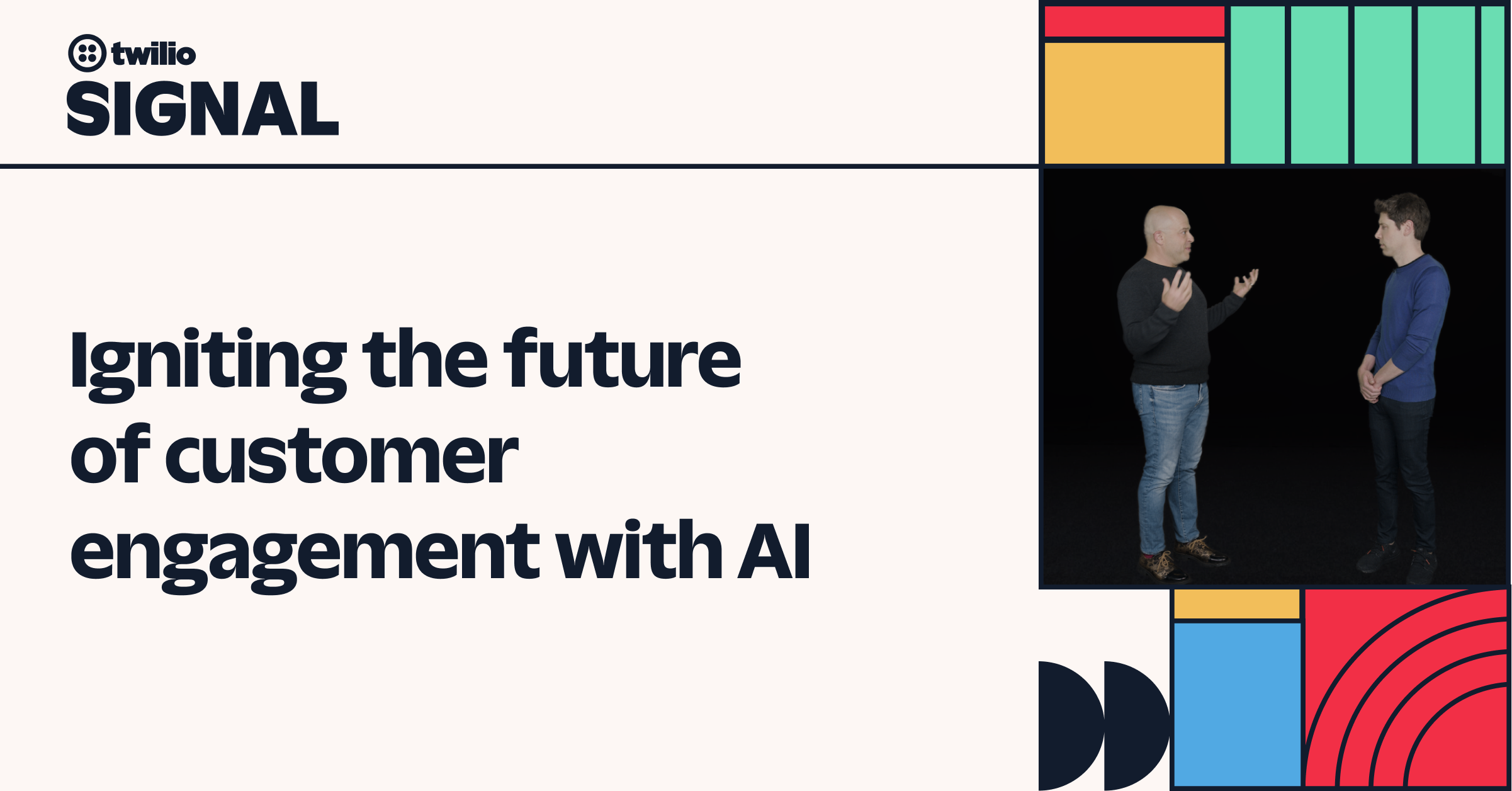Igniting the future of customer engagement with AI
Time to read:

In the ever-evolving landscape of artificial intelligence (AI) technology, OpenAI has unlocked the potential of individuals, teams, start-ups, and billion-dollar companies. Twilio’s CEO Jeff Lawson recently had a chat with OpenAI’s Sam Altman at SIGNAL 2023, Twilio’s annual customer and developer conference, to share in their excitement and talk about the future of the space.
Statista reported that the potential impact of AI in the United States could increase GDP by 21%. And, McKinsey revealed that the impact of generative AI on productivity could add trillions of dollars in value to the global economy.
“That’s why Twilio is partnering with Open AI,” says Lawson. “We’re introducing the AI personalization engine powered by Twilio Segment, which allows companies to take all the data they have about their customers and bring it into all the interactions they’re building on top of Open AI.”
OpenAI and Twilio amplify the potential of customized support
Customer service is not what it used to be, and support agents are catching on to the power of AI as a data-savvy co-pilot. A recent study from the National Bureau of Economic Research showed a 14% increase in productivity among customer support agents who leveraged the help of chatbots. Traditional chatbots are evolving into intelligent, personalized assistants that can reshape how we engage with companies.
AI-driven chatbots offer a level of assistance and problem-solving that was previously unimaginable. Whether addressing sales inquiries or troubleshooting service issues, they can quickly deliver accurate, efficient, and tailored responses. “We’ll be able to answer questions better than the last generation of chatbots ever could,” says Lawson.
AI can not only help bridge the brand-consumer perception gap, but also propel the potential of chatbots to new heights. What’s even more appealing is that with AI, Twilio’s customers have the potential to drive down the cost of energy and intelligence. “We’re talking about orders of magnitude cheaper,” says Lawson, “Suddenly, you can unlock every customer.”
What’s more, these bots will have to have an understanding of who they're talking to, which is more important than ever for brands. Although 46% of brands believe they’re doing an excellent job of providing personalization, just 15% of consumers agree, according to Twilio’s 2023 State of Customer Engagement Report.
AI lowers the cost of intelligence while increasing personalization
Even though the power of personalized experiences is clear, the cost of intelligence still proves a significant barrier. Crafting tailored interactions for every customer demands a level of resources that, until now, has been prohibitively expensive. “But with AI driving down the cost of intelligence, we can make that happen,” Altman says.
And it couldn’t come at a better time: According to Twilio’s report, 66% of consumers say they will quit a brand if their experience isn’t personalized.
The notion of a “digital twin,” an AI-generated representation of a customer, presents an intriguing approach to the kind of personalization customers expect. Leveraging customer behavior data, companies can build accurate digital profiles, enabling them to test and fine-tune interactions to suit individual preferences.
“We can use this digital twin to really understand the customer and make decisions on how best to serve them,” says Lawson. This fusion of AI and customer profiling allows businesses to anticipate needs, enhance decision-making, and deliver unparalleled value.
Limitless opportunities for AI-powered personalization
The potential value unlocked by AI-powered personalization is immense, promising sweeping benefits for both businesses and consumers. “When every company can deliver this deeply personalized experience, which would not be possible without AI, it’s going to be transformatively positive for how we interact with the world and what we expect from companies,” says Altman.
As AI technology continues to advance, every customer can expect experiences that align with their unique needs. This heightened level of personalization not only drives immediate engagement but enhances customer retention: According to Twilio’s report, 86% of consumers acknowledge that personalized experiences increase their loyalty to specific brands. “It’ll empower companies to be better operators and more efficient at the same time, which is super exciting,” Lawson says.
And, as AI-driven advancements pave the way to revolutionary changes, the possibilities are seemingly limitless for everything from education to healthcare. One compelling application is enhancing productivity—not only empowering developers to increase efficiencies, but enabling professionals in every field, department, and industry to maximize output. According to a Forbes Advisor survey, 64% of businesses believe that artificial intelligence will help increase their overall productivity.
“OpenAI has ignited developer energy around what people can build,” says Lawson. Of course, Altman says, “It’s the developers that ignite the energy for us.”
To learn more about implementing Twilio’s CustomerAI capabilities using quality real-time data, check out all of the exciting content we have around what’s possible with AI from SIGNAL, now available on-demand for free on the SIGNAL platform.
Related Posts
Related Resources
Twilio Docs
From APIs to SDKs to sample apps
API reference documentation, SDKs, helper libraries, quickstarts, and tutorials for your language and platform.
Resource Center
The latest ebooks, industry reports, and webinars
Learn from customer engagement experts to improve your own communication.
Ahoy
Twilio's developer community hub
Best practices, code samples, and inspiration to build communications and digital engagement experiences.


